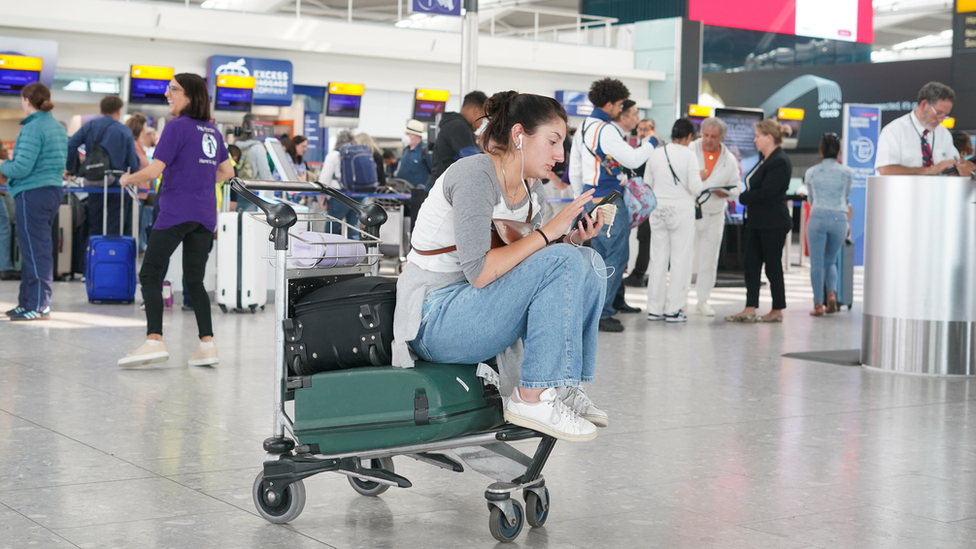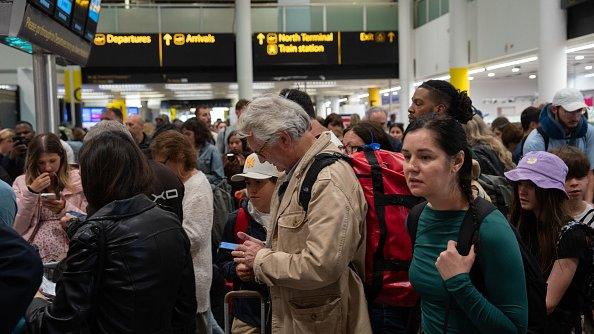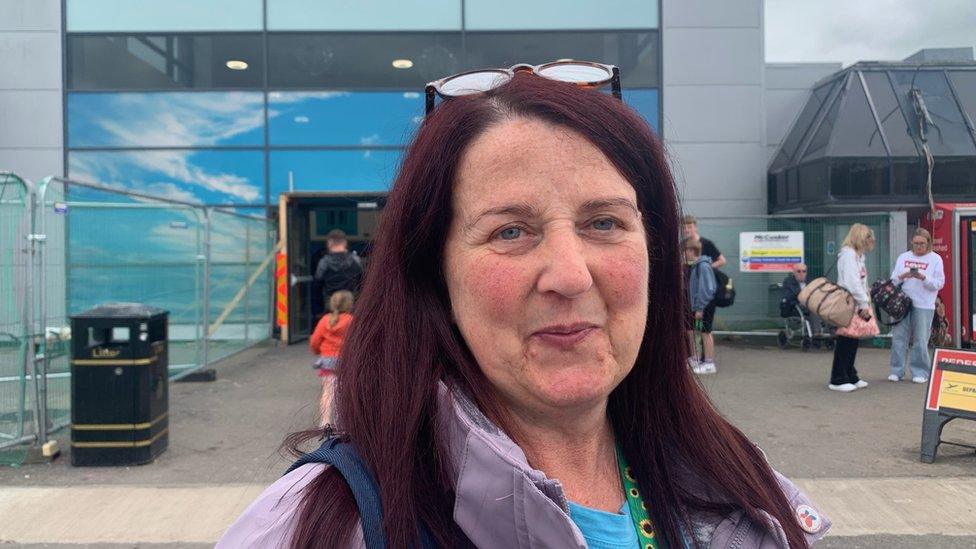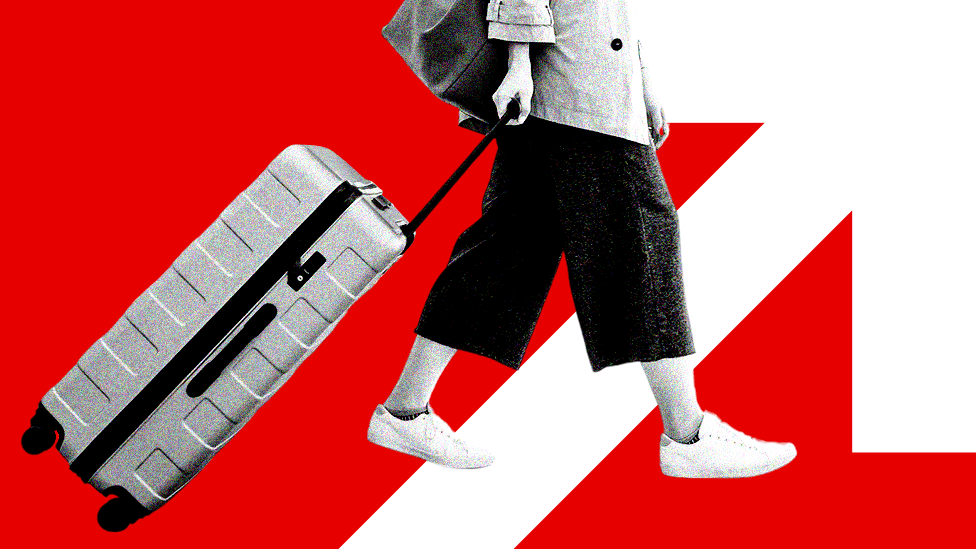We can avoid flight chaos in future, says air traffic boss
- Published

Martin Rolfe has apologised to those affected by flight disruption
The flight chaos caused by a data processing glitch should not happen again, the head of National Air Traffic Services (Nats) has said.
Martin Rolfe told the BBC that measures were in place to protect against the "incredibly rare" system failure which has left hundreds of flights cancelled.
"If that happens again, we can resolve it very, very quickly," he said.
Thousands of passengers faced a nightmare Bank Holiday Monday, with many left stuck abroad and in the UK.
Some people slept on airport floors or in makeshift beds, while many scrambled to rebook flights.
Passengers reported being left out of pocket after arranging alternative transport and accommodation following the cancellation of more than 1,500 flights on Monday.
The delays and cancellations continued into Tuesday despite the air traffic control issue being fixed as the disruption had left planes and pilots out of place.
Nats controls most aircraft in UK airspace and receives millions of flight plans every year. Airlines submit every flight path to the national control centre and these should automatically be shared with Nats controllers.
But on Monday, Nats received data that it could not process.
Mr Rolfe said the system was designed to "fail safely" if this happened, to make sure erroneous information could not be passed on to air traffic controllers.
This caused Nats to revert to a manual system - meaning fewer flights could be handled. For several hours they had to manually input flight routes, rather than it happen automatically, which was slower and caused a huge backlog.
Mr Rolfe apologised to those affected, insisting he was confident the situation would not arise in the same way again.
"We understand the way the system didn't handle the data... the way it failed, if you like," he said.
Nats remedied the fault around three hours after announcing it just before midday on Monday, but widespread disruption had already occurred in that time.
The incident will be investigated by the Civil Aviation Authority (CAA). Nats has confirmed there were no signs the failure was caused by a cyber-attack.
Aviation analytics firm Cirium, said that as of 09:00 BST on Wednesday, 30 flights had been cancelled departing UK airports - about 1% of all departures. It said 34 flights had also been cancelled arriving in the UK so far.
Cirium's data suggested almost 2,000 inbound and outbound flights had been cancelled since the disruption started on 28 August.
Heathrow, Gatwick, Manchester, Aberdeen and Edinburgh have been the worst hit airports.
Willie Walsh, the former boss of British Airways and current director general of airlines' trade body the International Air Transport Association, told the BBC's Today programme that the industry was looking at "costs in the tens of millions" and possibly as high as a £100m as a result of the failure.
"You're looking at hundreds of thousands of customers impacted by cancellations, and that doesn't take into account the hundreds of thousands of passengers impacted by delays on the day," he added.
Mr Walsh said it was "very unfair" for airlines to face costs due to the delays and cancellations to journeys being "completely outside" their control.
"The air traffic control system which was at the heart of this failure, doesn't pay a single penny," he added.
Mr Walsh said he believed Nats should be fined and that the company had a "lot of questions to answer".
"I find it staggering I really do. This system should be designed to reject data that is incorrect, not to collapse the system," he added.
But Mr Rolfe said Mr Walsh's claims that the whole system had collapsed was "not quite accurate" and that the company "lost part of the system".
"The piece that failed and it failed because it didn't recognise a message, meant we were not able to process as many flights as quickly as we normally would," he added.
Tim Jeans, a former director of Ryanair and Monarch Airlines and chair of Newquay Airport until 2021, said regulations meant that people would be entitled to claim expenses incurred from airlines and tour operators, including for accommodation, as a result of flights being cancelled.
He said airlines pay hundreds of millions of pounds per year to Nats for the service and would be "rightly asking" questions over the system.
After chairing a meeting between Nats, the CAA, airlines, airports, trade bodies and Border Force, Transport Secretary Mark Harper said on Tuesday that knock-on effects of the disruption were likely to continue over the coming days.
He advised anyone due to travel in that time to check with airlines before heading to the airport.
In its latest statement, EasyJet offered to put on extra flights to help bring people back to the UK. The boss of Ryanair, meanwhile, said it had had to cancel about 250 flights already, affecting around 40,000 passengers.
One such passenger, Sarah Skellern, told BBC News she and her family were forced to sleep on the floor of Palma de Mallorca Airport, Spain, after waiting on a Jet2 aircraft for six hours before it was cancelled.
Mrs Skellern, from near Preston, Lancashire, described "absolute chaos" at Palma de Mallorca Airport. She and her family eventually got a flight home the next day.
Jonny Beattie was due to fly back from Faro in Portugal to Belfast with his family on Monday, but now is unable to get a flight until next Monday, which means his children are missing the start of the school year.
"You could see everybody went [to] panic stations," he said. "Some people were already checking flights and we could see we couldn't get any flights until next Monday.
Mr Beattie said he managed to rebook the accommodation that they had just left, but added it was going to cost him just under £1,000.
Watch: The day UK air traffic control went down... in 71 seconds

Have you been personally affected by the disruption to flights? Get in touch by emailing haveyoursay@bbc.co.uk, external.
Please include a contact number if you are willing to speak to a BBC journalist. You can also get in touch in the following ways:
WhatsApp: +44 7756 165803
Tweet: @BBC_HaveYourSay, external
Please read our terms & conditions and privacy policy
If you are reading this page and can't see the form you will need to visit the mobile version of the BBC website to submit your question or comment or you can email us at HaveYourSay@bbc.co.uk, external. Please include your name, age and location with any submission.
Related topics
- Published29 August 2023

- Published29 August 2023

- Published29 August 2023

- Published28 August 2023

